| Listing 1 - 10 of 15 | << page >> |
Sort by
|
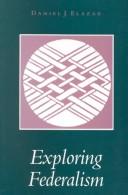
ISBN: 0817302409 Year: 1987 Publisher: Tuscaloosa University of Alabama Press
Abstract | Keywords | Export | Availability | Bookmark
 Loading...
Loading...Choose an application
- Reference Manager
- EndNote
- RefWorks (Direct export to RefWorks)
Federal government --- Fédéralisme --- Fédéralisme --- Gouvernement fédéral --- Science politique
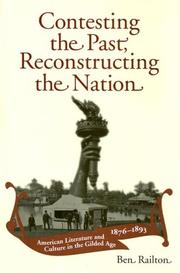
ISBN: 0817315802 9780817315801 0817357920 0817380205 9780817380205 Year: 2007 Volume: *3 Publisher: Tuscaloosa University of Alabama Press
Abstract | Keywords | Export | Availability | Bookmark
 Loading...
Loading...Choose an application
- Reference Manager
- EndNote
- RefWorks (Direct export to RefWorks)
Fables of American history embodied in Gilded Age literature In this study of Gilded Age literature and culture, Benjamin Railton proposes that in the years after Reconstruction, America's identity was often contested through distinct and competing conceptions of the nation's history. He argues that the United States moved toward unifying and univocal historical narratives in the years between the Centennial and Columbian Expositions, that ongoing social conflict provided sites for complications of those narratives, and that works of historical literature offer some
American national characteristics in literature --- Amerikaans volkskarakter in de literatuur --- Cable, George Washington, 1844-1925. The Grandissimes --- Caractéristiques nationales américaines dans la littérature --- National characteristics [American ] in literature --- Race dans la littérature --- Race in literature --- Ras in de literatuur --- Rôle selon le sexe dans la littérature --- Seksuele rolpatronen in de literatuur --- Sex role in literature --- Volkskarakter [Amerikaans ] in de literatuur --- American literature --- Literature and society --- National characteristics, American, in literature --- History and criticism --- History --- 19th century --- United States --- National characteristics, American, in literature. --- Sex role in literature. --- Race in literature. --- History and criticism.
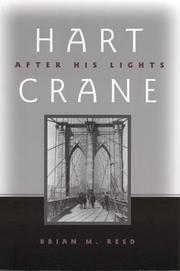
ISBN: 0817314881 9780817314880 0817352708 0817382925 9780817382926 9780817352707 Year: 2006 Publisher: Tuscaloosa University of Alabama Press
Abstract | Keywords | Export | Availability | Bookmark
 Loading...
Loading...Choose an application
- Reference Manager
- EndNote
- RefWorks (Direct export to RefWorks)
A critical reassessment of the life's work of a major American poet. With his suicide in 1932, Hart Crane left behind a small body of work-White Buildings (1926) and The Bridge (1930). Yet, Crane's poetry was championed and debated publicly by many of the most eminent literary and cultural critics of his day, among them Van Wyck Brooks, Kenneth Burke, Robert Graves, Allen Tate, and Edmund Wilson. The Bridge appears in its entirety in the Norton Anthology of American Literature, and Crane himself has been the subject two recent biographie
Crane, Harold Hart --- Criticism and interpretation --- Modernism (Literature) --- United States --- Crane, Hart, --- Crane, Harold Hart, --- Criticism and interpretation. --- Crane, Hart
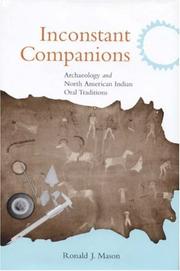
ISBN: 0817381414 9780817381417 0817315330 9780817315337 Year: 2006 Publisher: Tuscaloosa, AL University of Alabama Press
Abstract | Keywords | Export | Availability | Bookmark
 Loading...
Loading...Choose an application
- Reference Manager
- EndNote
- RefWorks (Direct export to RefWorks)
One of the most significant theoretical issues in contemporary American archaeology-the role of oral tradition in scientific research. Ronald J. Mason explores the tension between aboriginal oral traditions and the practice of archaeology in North America. That exploration is necessarily interdisciplinary and set in a global context. Indeed, the issues at stake are universal in the current era of intellectual ""decolonization"" and multiculturalism. Unless committed to writing, even the most esteemed utterances are inevitably f
Ethnohistory --- Oral tradition --- Indians of North America --- Tradition, Oral --- Oral communication --- Folklore --- Oral history --- Folk-lore, Indian --- Ethnohistorical method --- Historical anthropology --- Historical ethnology --- Anthropology --- Ethnology --- History. --- Methodology
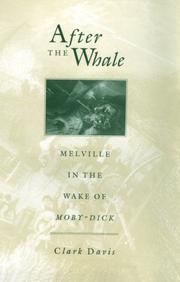
ISBN: 0585179344 9780585179346 0817307745 9780817307745 9780817393755 0817393757 Year: 1995 Publisher: Tuscaloosa ; London The University of Alabama Press
Abstract | Keywords | Export | Availability | Bookmark
 Loading...
Loading...Choose an application
- Reference Manager
- EndNote
- RefWorks (Direct export to RefWorks)
After the Whale contextualizes Herman Melville's short fiction and poetry by studying it in the company of the more familiar fiction of the 1850s and 1890s. The study focuses on Melville's vision of the purpose and function of language from Moby-Dick through Billy Budd with a special emphasis on how language - in function and form - follows and depends on the function and form of the body, how Melville's attitude toward words echoes his attitude toward flesh.
American Literature --- English --- Languages & Literatures --- Melville, Herman, --- Melville, Herman --- Melvill, German --- Melville, Hermann --- Meville, Herman --- Melvil, Cherman --- Mai-erh-wei-erh, Ho-erh-man --- Melṿil, Herman --- Tarnmoor, Salvator R. --- מלוויל, הרמן, --- מלויל, הרמן, --- ميلڤيل، هرمن، --- 麥爾維爾, --- Virginian spending July in Vermont, --- Melvill, Herman, --- Criticism and interpretation. --- Criticism and interpretation
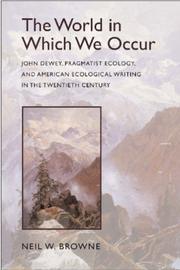
ISBN: 0817380175 9780817380175 9780817315818 0817315810 Year: 2007 Publisher: Tuscaloosa University of Alabama Press
Abstract | Keywords | Export | Availability | Bookmark
 Loading...
Loading...Choose an application
- Reference Manager
- EndNote
- RefWorks (Direct export to RefWorks)
American philosopher John Dewey considered all human endeavors to be one with the natural world. In his writings, particularly Art as Experience (1934), Dewey insists on the primacy of the environment in aesthetic experience. Dewey's conception of environment includes both the natural and the man-made. The World in Which We Occur highlights this notion in order to define "pragmatist ecology," a practice rooted in the interface of the cultural and the natural. Neil Browne finds this to be a significant feature of some of the most important ecological writing of the last centu
Human ecology --- Human ecology in literature. --- Philosophy. --- Dewey, John, --- Tu-wei, --- Tu-wei, Yüeh-han, --- Dyui, --- Dʹi︠u︡i, Dzhon, --- Dyuʼi, G'on, --- Дьюи, Джон, --- ديوى، جون، --- 杜威, --- Dīvīy, Jān, --- ديويي، جان --- Criticism and interpretation. --- Dīwʼī, Jān, --- Dīwiʼī, Jān, --- ديوئى، جان --- Diyūʼī, Jān, --- Human ecology in literature --- Philosophy --- Dewey, John --- Criticism and interpretation --- Muir, John --- Steinbeck, John --- Carson, Rachel --- Haines, John --- Lopez, Barry --- Dyūwi, Jon, --- Dyūi, Jon, --- デューウィジョン, --- デューイジョン, --- ジョン・デューウィ, --- ジョン・デューイ,
Book
ISBN: 0817382550 9780817382551 9780817315962 0817315969 9780817354664 0817354662 Year: 2008 Publisher: Tuscaloosa University of Alabama Press
Abstract | Keywords | Export | Availability | Bookmark
 Loading...
Loading...Choose an application
- Reference Manager
- EndNote
- RefWorks (Direct export to RefWorks)
Much of Jamaican prehistoric research-like that in the rest of the Caribbean basin-has been guided by at least a subconscious attempt to allow prehistoric native peoples to find their places within the charts established by Irving Rouse, who guided Caribbean research for much of the last half-century. The pre-Columbian peoples of Jamaica, and not merely their material culture, are beginning to take form, revealing their lifestyles and rituals, and taking their rightful place among the cultures of the New World. Pre-Columbian Jamaica represents the first subs
Indians of the West Indies --- Excavations (Archaeology) --- Indigenous peoples --- Archaeological digs --- Archaeological excavations --- Digs (Archaeology) --- Excavation sites (Archaeology) --- Ruins --- Sites, Excavation (Archaeology) --- Archaeology --- Jamaica --- Antiquities.

ISBN: 081738216X 9780817382162 0817315373 9780817315375 9780817355524 0817355529 Year: 2007 Publisher: Tuscaloosa University of Alabama Press
Abstract | Keywords | Export | Availability | Bookmark
 Loading...
Loading...Choose an application
- Reference Manager
- EndNote
- RefWorks (Direct export to RefWorks)
Art and literature --- Visual perception in literature. --- History --- Wharton, Edith, --- Jones, Edith Newbold --- Olivieri, David, --- Wharton, Edith Newbold Jones, --- Уортон, Эдит, --- Gouorton, Intith, --- Criticism and interpretation. --- Knowledge --- Wharton, Edith Newbold --- Criticism and interpretation --- Art --- United States --- 20th century --- Visual perception in literature
Book
ISBN: 0817383166 9780817383169 9780817355340 0817355340 Year: 2009 Publisher: Tuscaloosa University of Alabama Press
Abstract | Keywords | Export | Availability | Bookmark
 Loading...
Loading...Choose an application
- Reference Manager
- EndNote
- RefWorks (Direct export to RefWorks)
This book seeks to debunk eleven popular and prevalent myths about Caribbean history. Using archaeological evidence, it corrects many previous misconceptions promulgated by history books and oral tradition as they specifically relate to the pre-Colonial and European-contact periods. It informs popular audiences, as well as scholars, about the current state of archaeological/historical research in the Caribbean Basin and asserts the value of that research in fostering a better understanding of the region's past. Contrary to popular belief, the history of the C
Caribbean Area --- Caribbean Free Trade Association countries --- Caribbean Region --- Caribbean Sea Region --- West Indies Region --- History --- Errors, inventions, etc.
Book
ISBN: 0817391231 9780817391232 9780817319472 0817319476 Year: 2017 Publisher: Tuscaloosa University of Alabama Press
Abstract | Keywords | Export | Availability | Bookmark
 Loading...
Loading...Choose an application
- Reference Manager
- EndNote
- RefWorks (Direct export to RefWorks)
"A timely study of contemporary American literature that highlights the everpresence of Puritan myths in American identity and culture"-- "In this provocative and thought-provoking volume, Christopher Leise sheds new light on modern American novelists who question not only the assumption that Puritans founded New England--and, by extension, American identity--but also whether Puritanism ever existed in the United States at all. The Story upon a Hill: The Puritan Myth in Contemporary American Fiction analyzes the work of several of the most important contemporary writers in the United States as reinterpreting commonplace narratives of the country's origins with a keen eye on the effects of inclusion and exclusion that Puritan myths promote. In 1989, Ronald Reagan recalled the words of Massachusetts Bay Colony governor John Winthrop, who imagined the colony as a "city upon a hill" for future nations to emulate. In Reagan's speech, Winthrop's signature rhetoric became an emblem of American idealism, and for many Americans, the Puritans' New England was the place where the United States forged its original identity. But what if Winthrop never gave that speech? What if he did not even write it? Historians cannot definitively answer these questions. In fact, no group that we refer to as American Puritans thought of themselves as Puritans. Rather, they were a group of dissident Christians often better defined by their disagreements than their shared beliefs. Literary scholars interested in Anglo-American literary production from the seventeenth century through the present, historians, and readers interested in how ideas about Christianity circulate in popular culture will find fascinating the ways in which William Gaddis, Kurt Vonnegut, Thomas Pynchon, and Marilynne Robinson repurpose so-called Puritan forms of expression to forge a new narrative of New England's Congregationalist legacy in American letters. Works by Colson Whitehead, Paul Auster, Toni Morrison, and others are also considered. The Story upon a Hill raises a provocative question: if the Puritans never existed as we understand them, what might American history look like in that context?"--
American fiction --- Puritans in literature. --- Puritans --- Christianity and literature --- National characteristics, American, in literature. --- American literature --- Precisians --- Church polity --- Congregationalism --- Puritan movements --- Calvinism --- History and criticism. --- Influence. --- Amerikaanse roman --- Puritan movements in literature --- Puriteinen --- Christendom en literatuur --- National characteristics [American ] in literature --- 20e eeuw --- Geschiedenis en kritiek --- 21e eeuw --- Verenigde Staten --- Invloed
| Listing 1 - 10 of 15 | << page >> |
Sort by
|

 Search
Search Feedback
Feedback About UniCat
About UniCat  Help
Help News
News